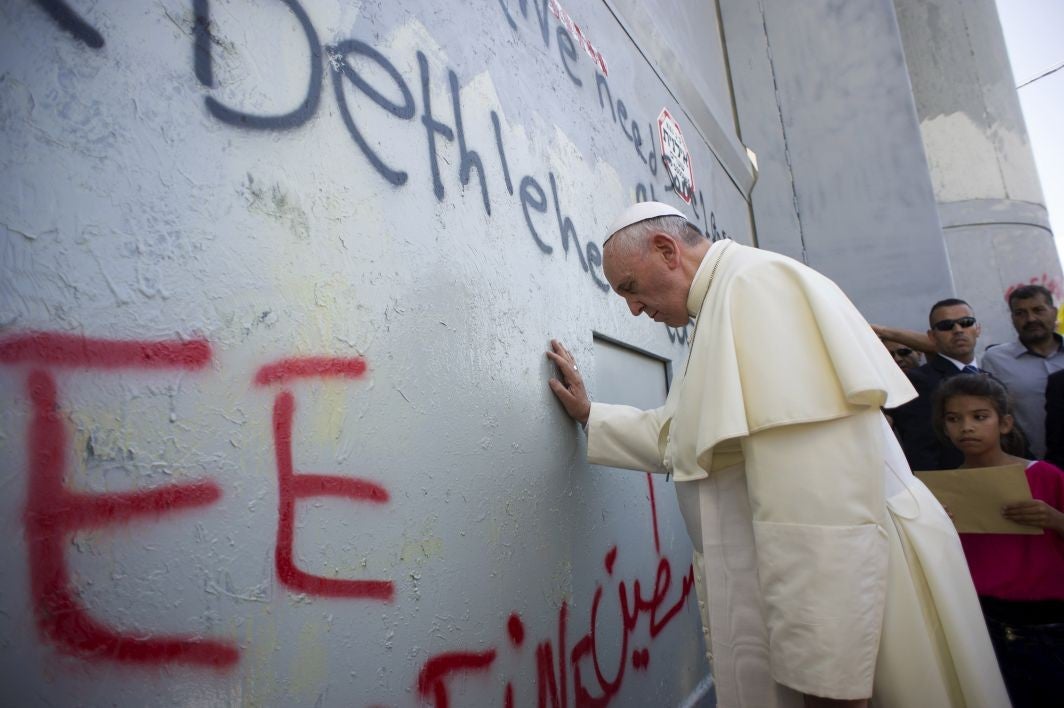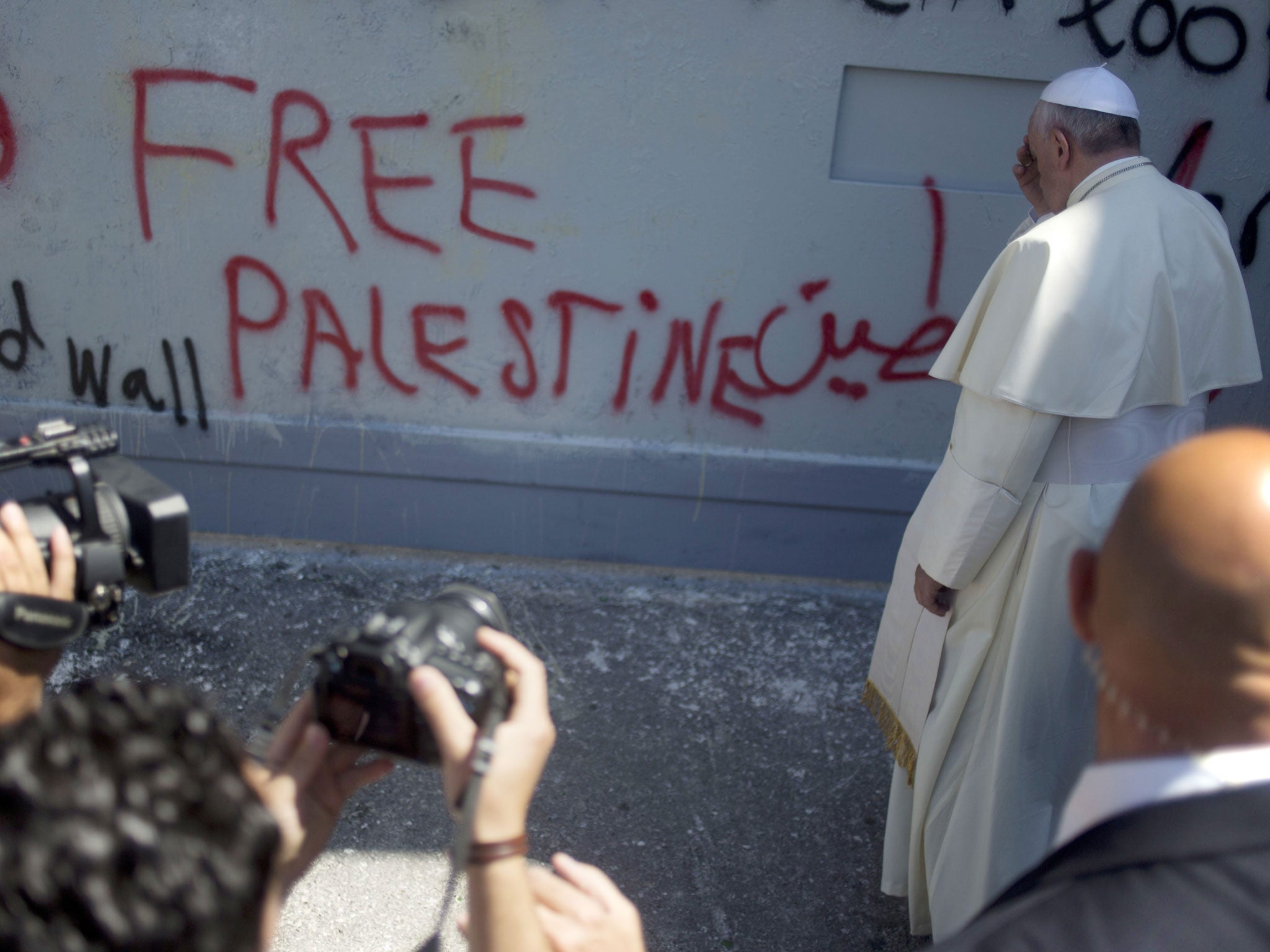Pope Francis tries to bridge Middle East divide with surprise stop to pray at controversial West Bank wall seen as symbol of Israeli oppression in Palestine
The Pope recognised 'the state of Palestine' and dramatically called for a summit between Presidents Abbas and Peres to be held in the Vatican in June

Pope Francis projected empathy with Palestinian suffering and made a foray into Middle East diplomacy on Sunday during a visit to Bethlehem.
On his way to celebrate Mass in Manger Square, near the traditional site of Jesus’s birth, the head of the Roman Catholic Church made a powerful gesture to Palestinians by praying and touching his head to the daunting, grey, Israeli separation barrier that divides Bethlehem from Jerusalem and which, to Palestinians, is the embodiment of Israeli oppression.
The Pope will spend Monday, the last day of his three-day trip to Jordan, Israel and the Palestinian Authority, in Jerusalem visiting the Yad Vashem Holocaust memorial and the Western Wall – Judaism’s holiest site. He will hold a Mass at the traditional site of the Last Supper and hold talks with Israeli President Shimon Peres, and Prime Minister, Benjamin Netanyahu.
The Vatican’s official spokesman, Father Federico Lombardi. said the pontiff invited the Palestinian President, Mahmoud Abbas, to the Vatican and pray for peace with him and Mr Peres.

“I offer my home in the Vatican as the place of prayer. All of us, especially those at the service of their people, have the duty to become artisans of peace especially by our prayers. Building peace is difficult but living without it is a torment,” Mr. Lombardi quoted the pontiff as saying.
Later, both Mr Abbas and Mr Peres confirmed that they would meet the Pope in the Vatican next month.
The pope also visited Bethlehem's Dehaishe Refugee Camp, where children greeted him with songs and gifts expressing their longing for homes in what became Israel that their forebears lost during the 1948 war in which they fled or were expelled.''Please look always for the future, have hope in the future,''the pontiff told them. ''It's very important to know that violence only brings violence. You can only succeed with peace.''
If the pope meets Mr. Abbas and Mr. Peres as expected next month, he will be preaching to the converted. The dovish Mr. Peres, who has only ceremonial powers, and Mr. Abbas reached an outline peace deal two years ago in secret talks. The pope did not invite hard line Israeli Prime Minister Benjamin Netanyahu to pray with Mr. Abbas because ''it would be too political with Netanyahu''said Jamal Daibes, spokesman for the pontiff's Holy Land visit.
For Palestinians, the most resonant part of the visit was at the separation barrier. The pope descended from his protective vehicle to approach the barrier, a structure Israel says is needed to keep out suicide bombers but which for Palestinians signifies how occupation cages them in..''The pope remained in silent prayer for 3,4, 5 minutes at the wall, touched it with his head, then went away,'' Father Lombardi said.
Fadi Salameh, a 27-year-old tourism worker who attended the mass, said this was ''extremely positive. It shows he identifies with the suffering of all the people. He's making the world a better place'' he said
Mr. Abbas said he had briefed the pope on ''obstacles'' the Israelis were setting to peace, foremost among them the settlements which many observers blame for undermining the Palestinian-Israeli negotiations that collapsed last month. While Israel blames Mr. Abbas for the talks failure, the pope termed him a ''man of peace.''
But speaking at the presidential palace in Bethlehem, Pope Francis avoided directly blaming Israel for the impasse as his hosts would have wanted. '' The time has come for everyone to find the courage to be generous and creative in the service of the common good, to have the courage to forge a peace which rests on the acknowledgment by all of the right of two states to exist and to live in peace and security within internationally recognized borders,'' he said.
At the mass Christians who came from all over the West Bank, Gaza and inside Israel said the papal visit was giving a boost to the dwindling Christian minority, vastly outnumbered by its Moslem and Christian neighbors. ''This is encouraging Christians and giving them strength.'' said Suhair Makhoul, a social worker from the northern Israeli city of Acre.
A highlight of the trip was scheduled for late on Sunday when the pope was due to meet Ecumenical Patriarch Bartholomew, the spiritual leader of the world's orthodox Christians to push forward inter-church conciliation.
* Francis’s trip has already been marked by controversy, as earlier Israeli police confirmed they arrested 26 Jewish nationalists who took part in a protest at the Cenacle in Jerusalem, the traditional site of Jesus's Last Supper, where the Pope is due to hold mass.
The protesters say the authorities are preparing to hand the Church the site, where some Jews believe King David is buried. The Israeli government has denied any such deal.
Israel has blamed the Palestinian president for the failure of the latest peace talks, but today, standing alongside Abbas, Francis pointedly referred to him as “a man of peace and a peacemaker”.